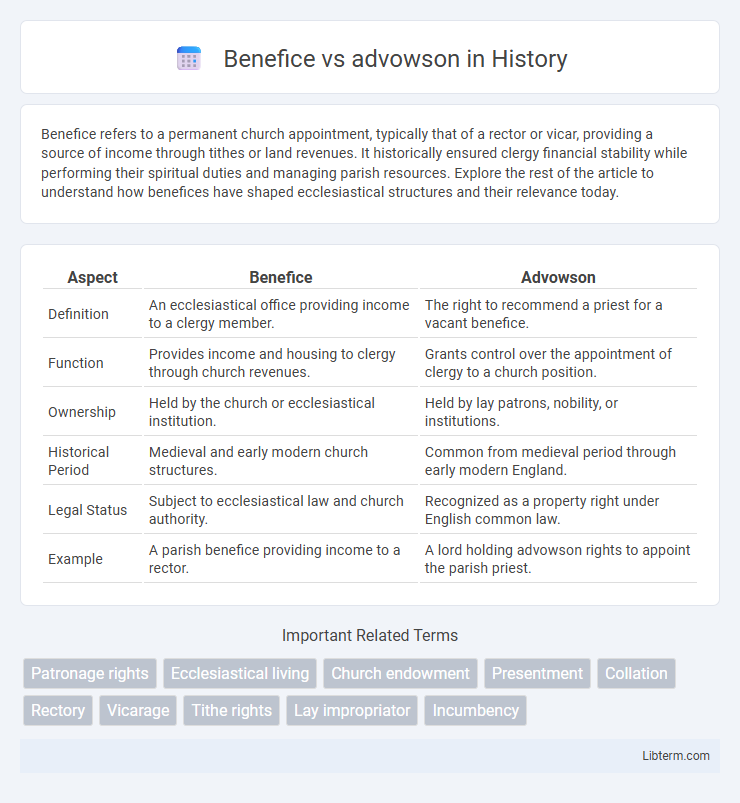Benefice refers to a permanent church appointment, typically that of a rector or vicar, providing a source of income through tithes or land revenues. It historically ensured clergy financial stability while performing their spiritual duties and managing parish resources. Explore the rest of the article to understand how benefices have shaped ecclesiastical structures and their relevance today.
Table of Comparison
| Aspect | Benefice | Advowson |
|---|---|---|
| Definition | An ecclesiastical office providing income to a clergy member. | The right to recommend a priest for a vacant benefice. |
| Function | Provides income and housing to clergy through church revenues. | Grants control over the appointment of clergy to a church position. |
| Ownership | Held by the church or ecclesiastical institution. | Held by lay patrons, nobility, or institutions. |
| Historical Period | Medieval and early modern church structures. | Common from medieval period through early modern England. |
| Legal Status | Subject to ecclesiastical law and church authority. | Recognized as a property right under English common law. |
| Example | A parish benefice providing income to a rector. | A lord holding advowson rights to appoint the parish priest. |
Introduction to Benefice and Advowson
A benefice refers to a church office or position endowed with fixed income or property for the maintenance of a clergyman, ensuring financial support through assigned revenues. Advowson is the legal right to recommend or appoint a priest to a benefice, granting patronage power over ecclesiastical appointments within a parish. Understanding the distinction between benefice as a source of clerical income and advowson as the patronage right is essential in ecclesiastical law and church governance.
Historical Origins of Benefice and Advowson
The historical origins of benefice trace back to the early medieval period, where land grants were given to clergy in exchange for religious services and maintenance. Advowson originated in Anglo-Saxon England as the right of a patron to present a nominee to a church benefice, establishing control over ecclesiastical appointments. These institutions evolved within the feudal and canon law systems, intertwining land tenure with ecclesiastical authority.
Legal Definitions: Benefice Explained
A benefice refers to a church office endowed with fixed capital assets that provide income to a cleric serving a parish or religious community under ecclesiastical law. This legal arrangement ensures financial support through revenues from property or tithes attached to the office. Unlike an advowson, which is the right to recommend a priest for appointment to a benefice, the benefice itself constitutes the actual spiritual and economic office held by the cleric.
Legal Definitions: Advowson Explained
Advowson is a legal right in English ecclesiastical law granting a patron the authority to present a nominee for a vacant benefice, effectively controlling the appointment of clergy to a parish church. A benefice, by contrast, is an ecclesiastical office endowed with fixed capital assets or income, providing financial support to the officeholder. The distinction lies in advowson representing the patronage or appointment right, while benefice denotes the actual ecclesiastical office and its associated revenues.
Key Differences Between Benefice and Advowson
Benefice refers to a permanent church appointment that provides income from church property, typically held by a clergyman, while advowson is the right to recommend or present a clergyman to a benefice. The key difference lies in benefice being the ecclesiastical office with associated revenue, whereas advowson is a legal right of patronage linked to the appointment process. Benefice ensures livelihood and pastoral duties, whereas advowson governs control over clerical nominations within the church hierarchy.
The Role of Benefice in Church Structure
A benefice is a church office endowed with fixed assets or income to support the clergy, crucial for sustaining ecclesiastical functions and ensuring clergy livelihood within the church hierarchy. Advowson, the right to appoint a parish priest to a benefice, serves as a legal and proprietary privilege often held by patrons or landowners. The role of a benefice in church structure centers on maintaining stable clerical positions and supporting pastoral duties, underpinning the operational continuity of parishes.
The Significance of Advowson in Patronage
Advowson represents the historic right to present a nominee to a church benefice, directly influencing ecclesiastical appointments and local religious governance. Unlike the benefice, which refers to the church office endowed with income, advowson confers control over patronage, shaping clerical leadership and community influence. This legal privilege was central to maintaining social power and religious authority within medieval and early modern England.
Transfer and Inheritance of Benefice and Advowson
The transfer and inheritance of a benefice involve ecclesiastical appointments where the right to receive income from church property is granted to a cleric, often subject to bishopric approval and canonical law. Advowson represents the legal right to recommend or present a nominee to a vacant benefice, traditionally inheritable or transferable through sale, gift, or bequest, making it a property interest distinct from the benefice itself. While a benefice confers spiritual responsibilities and income, an advowson functions as a patronage right enabling the transfer or inheritance of the power to influence ecclesiastical appointments without conveying clerical duties.
Modern Developments and Current Relevance
Modern developments in benefice and advowson reflect significant shifts in ecclesiastical property rights and clerical appointments within the Church of England. Benefices now often exist independently of traditional advowsons, with patronage rights increasingly subject to legal reforms and diocesan control, limiting private influence over clergy appointments. Current relevance centers on transparency and equitable appointment processes, emphasizing the church's adaptation to contemporary governance standards while preserving historical heritage.
Conclusion: Understanding Benefice and Advowson Today
Benefice and advowson represent distinct historical concepts in ecclesiastical law, with benefice referring to the church office endowed with revenue, while advowson pertains to the right to appoint a parish priest. Understanding these terms today highlights the evolution of church property rights and patronage systems within Anglican and historical English contexts. Clarifying their differences is essential for grasping the legal and cultural heritage influencing modern church administration and clergy appointments.
Benefice Infographic

 libterm.com
libterm.com